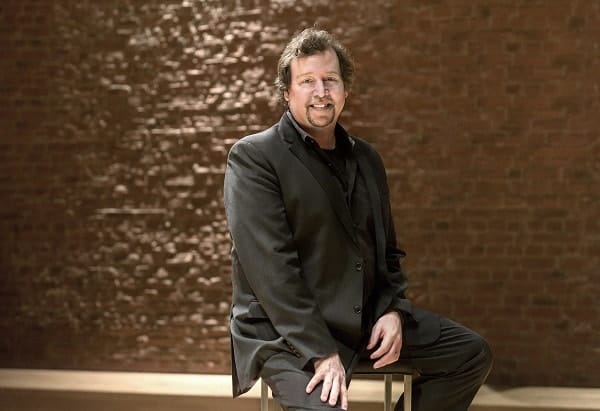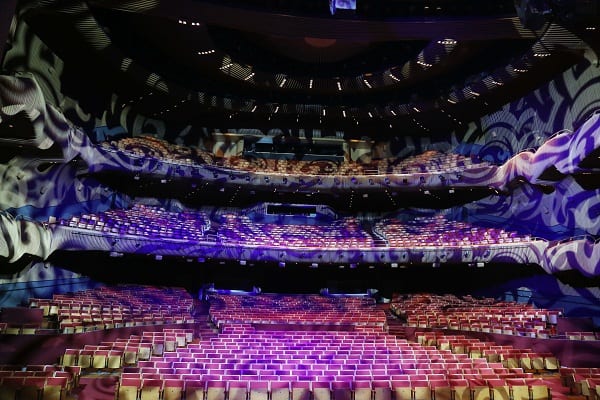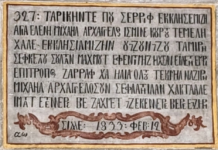For the second part of our interview, I asked Ray about his work at Zorlu Center PSM and how the project has developed over the past year.

How would you compare the PSM to other halls in the world?
Well, we are a multi-purpose performance hall, so that’s a different thing than a recital hall or a concert hall. Like, Carnegie Hall is purely a concert hall, it’s not a theater. Performing arts centers have been being built since about the late 1960s, and the whole idea behind them was making one theater that is appropriate for all kinds of art. And, unfortunately, because of technology, what you ended up with was one theater that was terrible at all kinds of art; it wasn’t appropriate for anything.
In the intervening time we have gotten better and better at these buildings. And, I will tell you that, having worked at many arts centers, this is the one that comes the closest yet to being perfect for every art form. It’s equally good for a band — you know, electronic, loud, crazy music — as it is for Fazıl Say playing Chopin etudes without a microphone. And everything in between — Broadway shows, operas, symphony. The room is so adjustable and so tuned, that it really really works.
Organizations that we are most similar to are probably the Kennedy Center in Washington, the Albert Hall in London, and the Lincoln Center in New York, which is where the Met is located. But we have the luxury of learning from the mistakes of all these buildings.
So, you wouldn’t call it a concert hall, but a performing arts center?
Yes, multi-purpose performance arts center. Emphasizing the fact that we have many different performance areas. And we are actually going to explore areas in the coming years that weren’t meant to be performance areas and turn them into performance areas. There is a lot of potential in that, in finding different and non-traditional ways to have an audience enjoy a show.
What has been your biggest challenge in terms of cultural difference in the concept of management?
There is a very different way of approaching productions between Turkey and Turkish companies and, say, companies the US and the UK. It’s just a different model. And when we produce this coming year, we will be bringing the models from the US and the UK here for how shows are produced and rehearsed. And we hope it will take hold. We are going to set standards for performance in this house that I think are different than the rest of Turkey. Companies, local companies, if they are going to come and work here, are going to abide by these values. And there are standards of production value and standards of safety backstage. It’s just a whole different way of operating.
What is the biggest challenge you’ve faced here?
Building something this big and this complicated, and getting it open as it did, as smoothly as it did. That was incredible, especially in a place that had never done it before. In the US, we build arts centers all over the place, and even there I have never opened a place as smoothly and easily as I did with this one.
That sounds unreal in Turkey…
It was not easy. But the dedication of the people who came to work here made it possible. I mean, the truth is we went ahead and scheduled a show. We paid for it, scheduled it. And we told everyone that the place has to be ready on this day, or else we will be standing in the rain, and we will be out several hundred thousand dollars. So, being able to book a show, pay for it, and pushing the place to get it done and open on time and on budget was a huge challenge. It is the thing we are all the most proud of.

Is there anything that you would like to see improved upon at the Zorlu Center?
There are problems that have to do with Istanbul, which is starting a show on time. And that is very hard, just because of the traffic here. We have to figure out what the best time to start a show is and we have to prepare the shows as they come in. A show like Cats, they want to start at bang on 8:00 pm because then they are done definitely at 10:38 pm. We have to tell them that, no, Istanbul is a place where there has to be some flexibility. In New York City, a Broadway show on a weekday starts at 7 o’clock. We do 8:30 pm here.
I don’t know if it could get any bigger or better than what I have seen in the 2014-2015 program, but who would be your dream performer at the PSM?
I would like to see Hugh Jackman here doing his one man Broadway show. He is the most dynamic and talented stage performer you have ever seen. He is a very big action star, but he is MUCH better on stage.
I would also very much like to start bringing not just musicals, but plays. Shakespeare, for instance. We would love to work with the Royal Shakespeare Company, to bring over some of their plays. And the National Theater of London has a great theater called Brook Theater, and there is a great play called War Horse, for instance — a lot of it takes place at Gallipoli. So, we want to develop our Broadway and our theater to the point that we feel that we can support a play in English. And we also want to support plays and musicals in Turkish, in the same sort of style — producing the Turkish versions of musicals. So we are actually going to start producing musicals next year in house.
Is there anything else that you would like to add? Any other message that you would like to give the expat and/or local audiences in Istanbul?
Expats, come here! It [Zorlu Center PSM] is such a great resource, it is such a great gift to Istanbul. People need to come, and once they come once, they are hooked. They come again, and again, and again.
What we want to prove is that the performing arts are for everybody, not just for rich people. A show like Phantom of the Opera, a show like Beauty and the Beast, and a show like La Boheme, which we will be bringing in from the Royal Opera in London, they’re not just for the highly educated and the rich. It’s for everybody. When Puccini wrote La Boheme, he wrote it for the masses, you know? He wrote it for people who couldn’t read and write. And if you stop thinking of opera as this high elite thing, and you start thinking of it as popular entertainment, that people paid two pennies for and watched, that’s what we want too. We want to demystify art. We want to say to the people of Istanbul that it’s worth your time and money to come and see these performances.
Could you briefly tell us about the pricing philosophy at PSM? I ask this deliberately as I know you have many alternatives, and there are tickets available even for those on a budget.
We try to make every show available to the entire spectrum of the economic strata. That includes selling some of the best seats in the house for 20 TL (students can buy these tickets on the day of the show). Yes, there are very expensive tickets, but even for those shows there are very affordable tickets in other areas of the auditorium. And I am okay with that because there is not a bad seat in the auditorium. Even if you are in the back seat of the third balcony, the acoustic is still bright, you still have a clear view of the stage. I kind of like it up there.
Is there anything else that you would like to add?
The response to our City Stage [a public performance project] has been incredible. I thought that it would take a lot longer for it to become established among the audience and the artists, but we are overwhelmed with people who want to perform. And our biggest problem now is scheduling them. So we are going to see this program expand into more nights for the coming year. But we think this is a great, it’s great for an artist to say: “I have performed at the Zorlu Center.” And that’s what we are allowing a whole generation of artists to say: “I have performed at the Zorlu Center. Come see me at the Zorlu Center.”
How can artists apply?
They can apply through our website. There is a certain level of quality that we are looking for — they have to show us that they have performed before either through a YouTube link or reviews, or something like that. But as long as they meet that base level of quality, it’s free for up to an hour.
You can read Part 1 of this conversation here.
To find out more about the Zorlu Center PSM and their upcoming season, visit their website.









